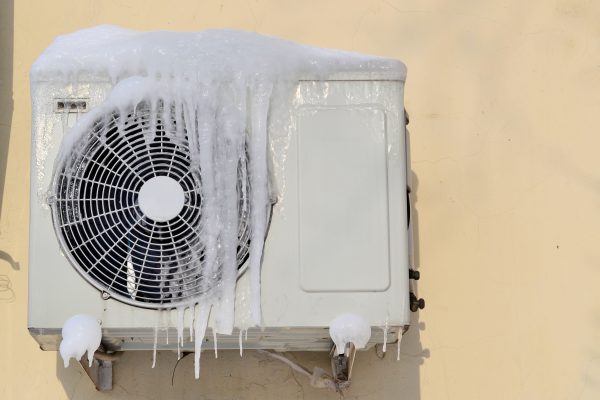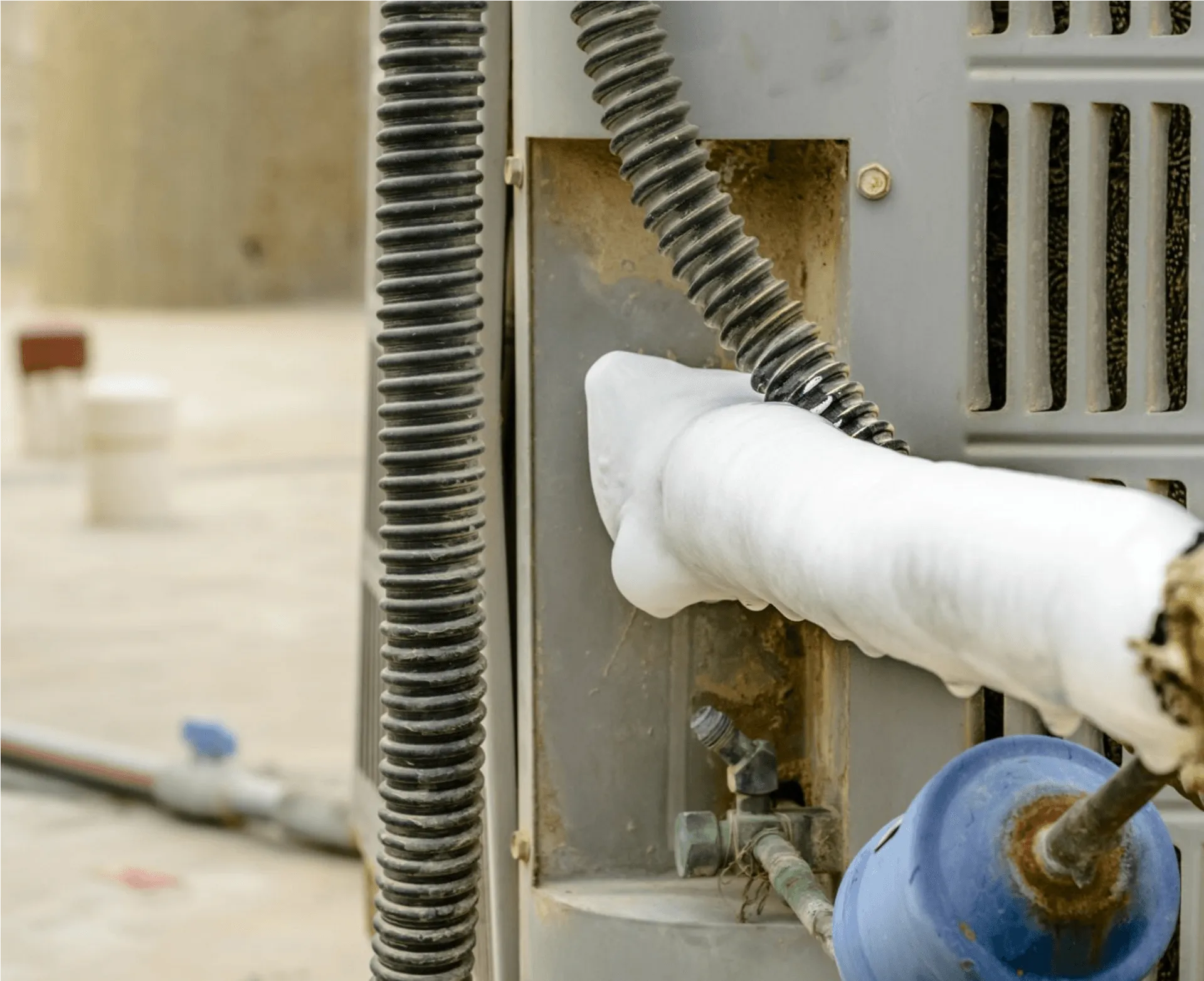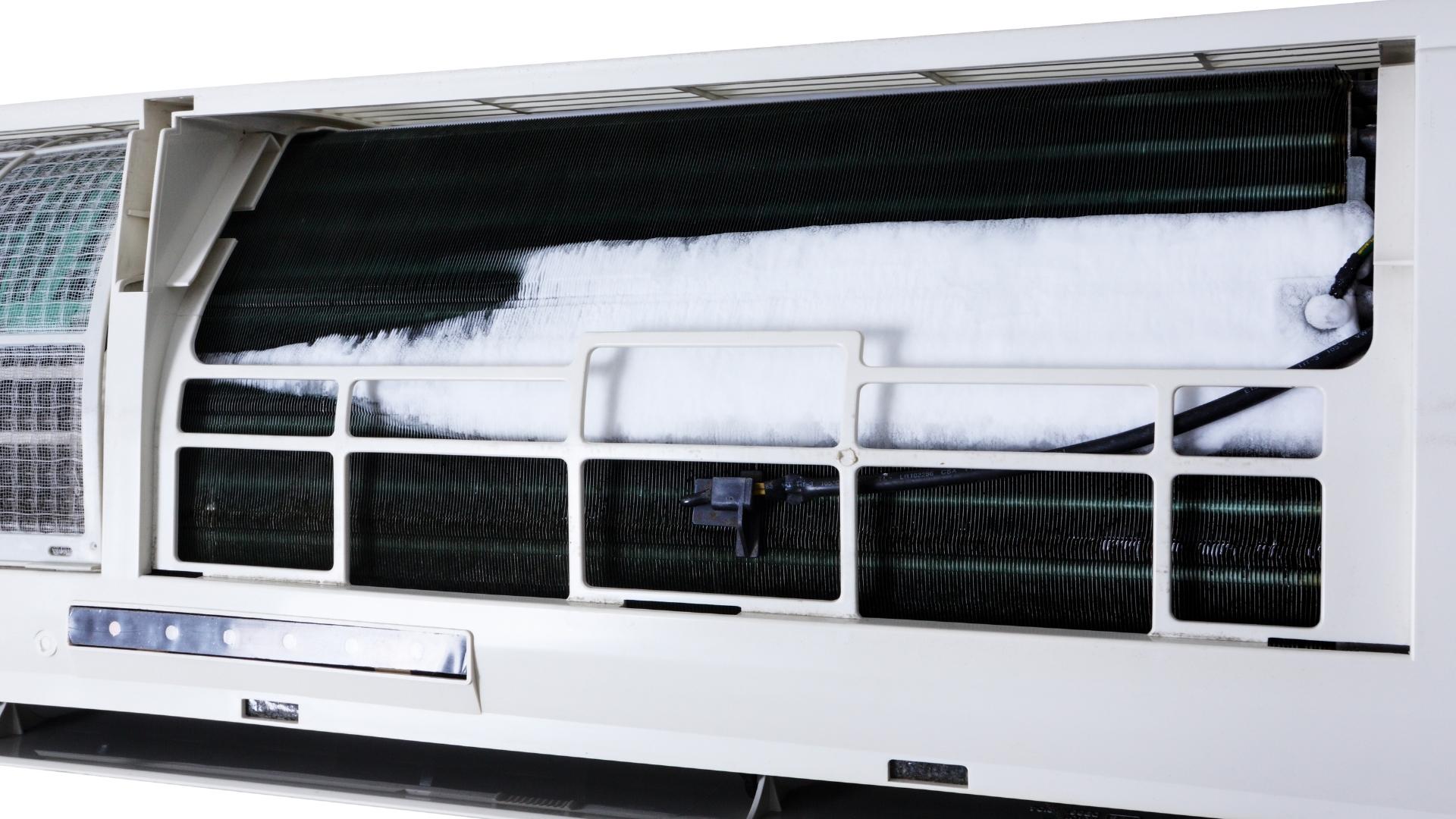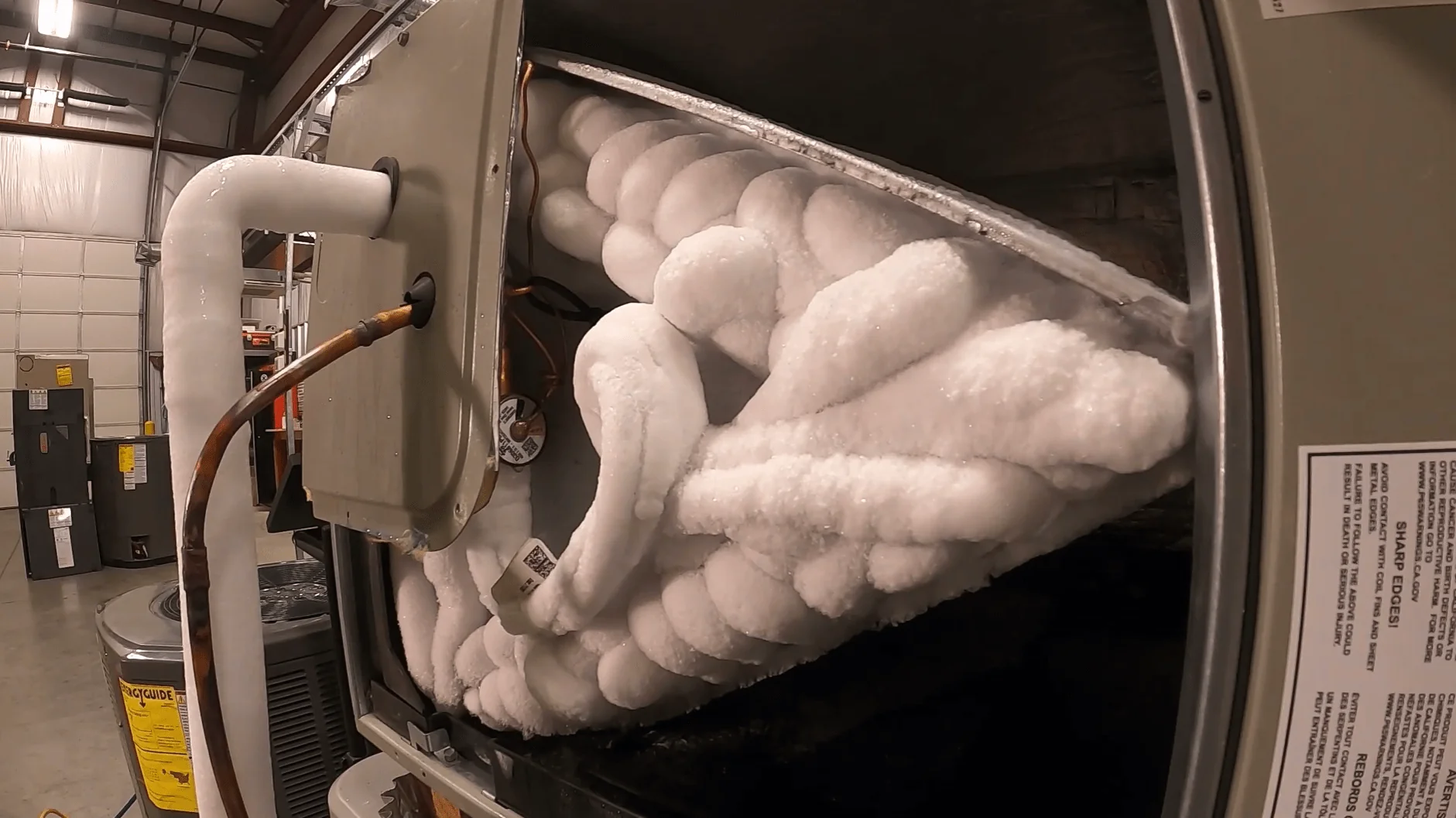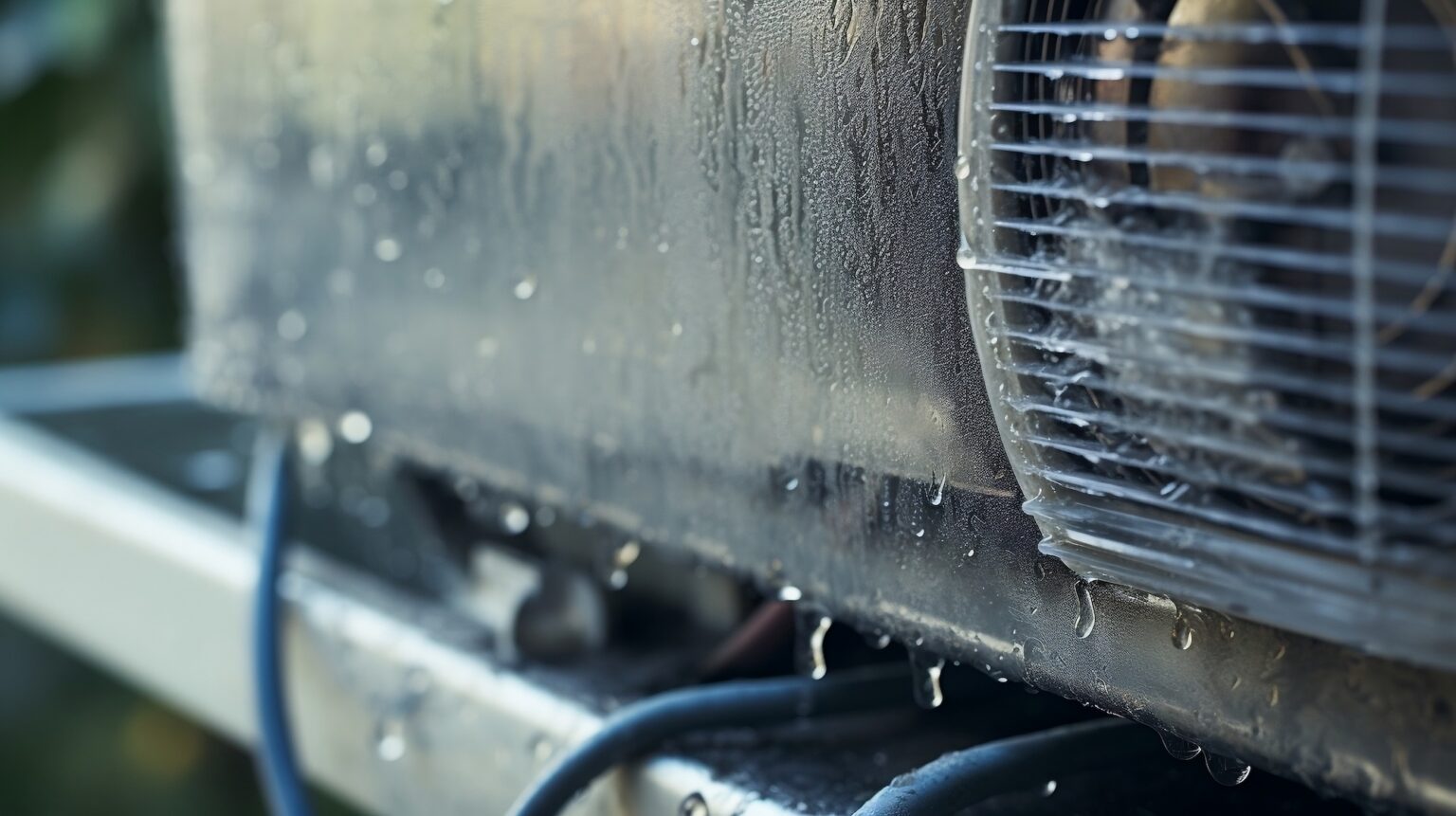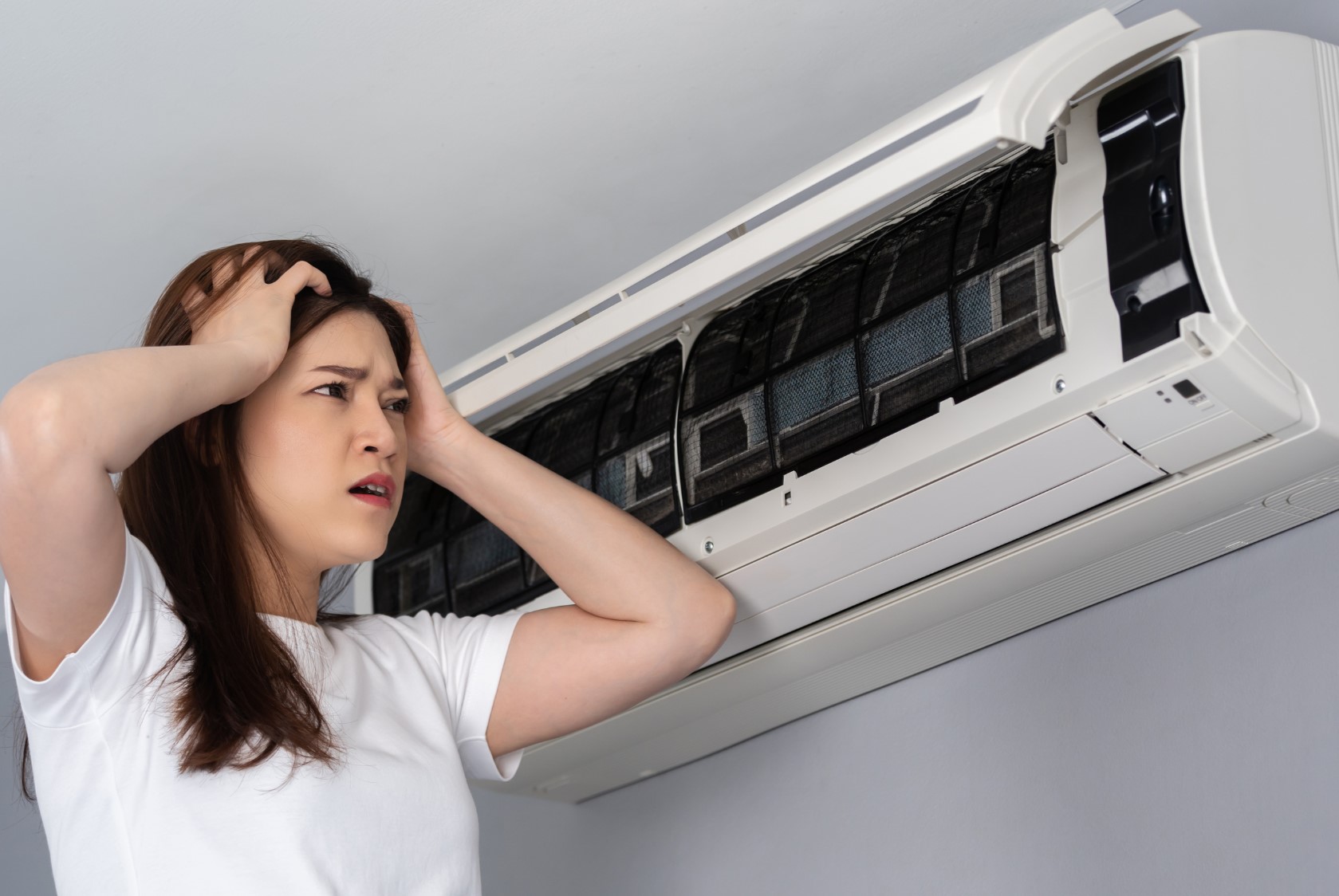Home>Home Maintenance>Why Does My Window Air Conditioner Freeze Up
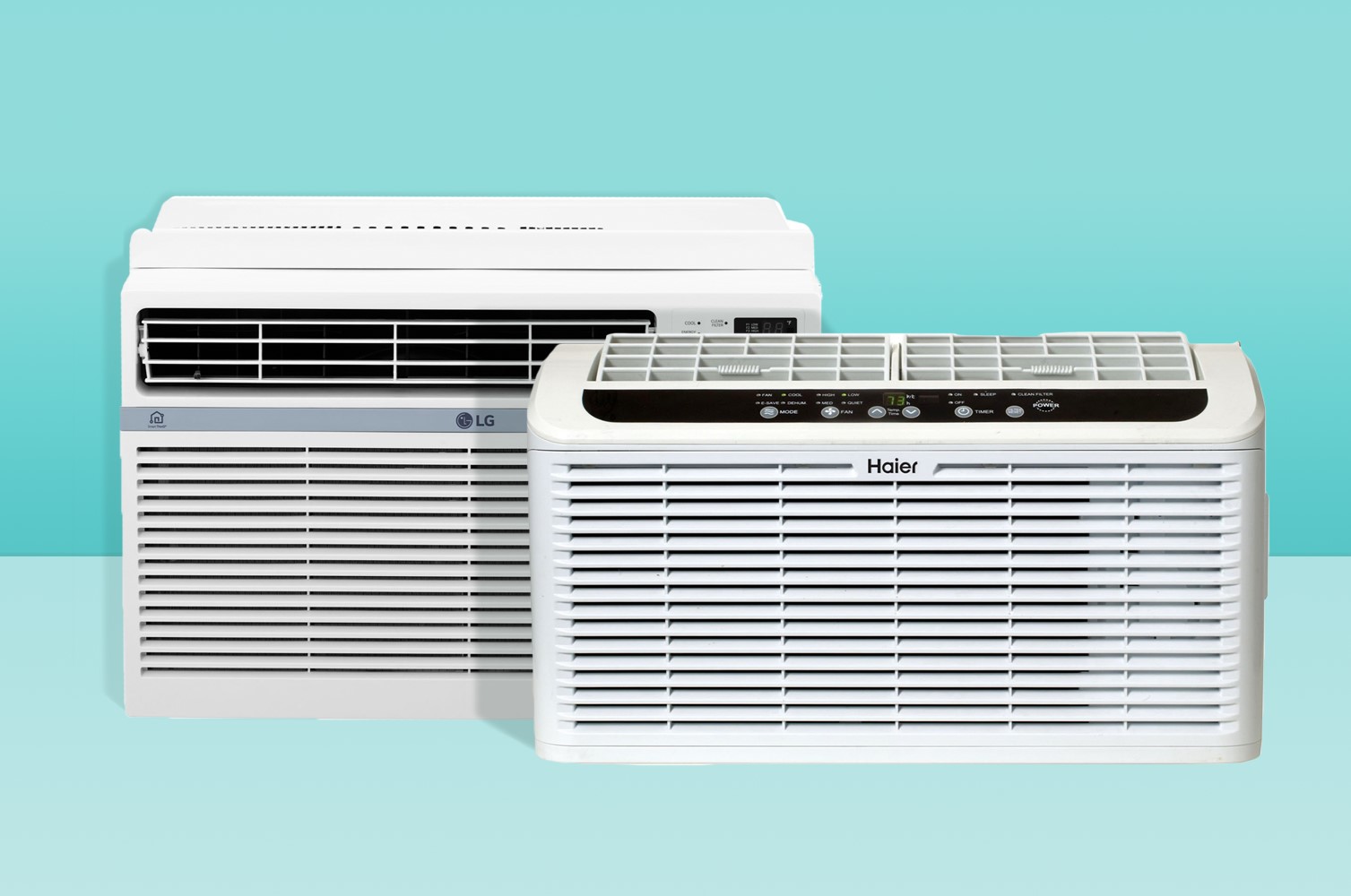

Home Maintenance
Why Does My Window Air Conditioner Freeze Up
Modified: April 28, 2024
Learn why your window air conditioner is freezing up and how to prevent it. Find expert home maintenance tips and solutions to keep your AC running smoothly.
(Many of the links in this article redirect to a specific reviewed product. Your purchase of these products through affiliate links helps to generate commission for Storables.com, at no extra cost. Learn more)
Introduction
Window air conditioners are a popular choice for cooling individual rooms or small spaces. They offer a cost-effective and convenient way to beat the heat during the sweltering summer months. However, it can be frustrating and concerning when your window air conditioner starts to freeze up. Not only does it hinder the cooling performance, but it can also cause damage to the unit itself.
Understanding why your window air conditioner freezes up is essential to diagnosing and resolving the issue effectively. In this article, we will explore the common causes of window air conditioner freezing and provide practical tips on how to prevent it from happening in the future. By taking proactive measures and ensuring proper maintenance, you can enjoy uninterrupted cooling and prolong the lifespan of your air conditioning unit.
Key Takeaways:
- Keep your window air conditioner from freezing by ensuring proper airflow, cleaning or replacing dirty air filters, and addressing low refrigerant levels promptly. Regular maintenance and professional inspections are essential for optimal performance.
- Prevent window air conditioner freezing by maintaining adequate airflow, proper insulation, and regular cleaning. Schedule professional maintenance to detect and address potential issues early, ensuring efficient cooling and prolonged lifespan.
Read more: Why Is My Air Conditioner Lines Freezing Up
Common Causes of Window Air Conditioner Freezing
There are several reasons why your window air conditioner may freeze up. Understanding these common causes can help you identify the root of the problem and take appropriate measures to resolve it. Here are some of the most frequent culprits:
- Insufficient Airflow: Lack of airflow around the unit can cause the evaporator coil to freeze. This can happen when the unit is placed in a tight space or when furniture or other objects obstruct the airflow.
- Dirty Air Filter: A dirty or clogged air filter restricts the airflow and prevents warm air from reaching the evaporator coil. As a result, the coil gets too cold and freezes up.
- Low Refrigerant: If your air conditioner is low on refrigerant, it can cause the evaporator coil to become excessively cold and freeze. This issue typically indicates a leak in the system and should be addressed by a professional technician.
- Faulty Thermostat: A malfunctioning thermostat can cause your air conditioner to run longer than necessary, leading to excessive cooling and potential freezing of the evaporator coil.
- Improper Installation: Incorrect installation, such as an improperly sized or tilted unit, can disrupt the flow of refrigerant and lead to freezing problems.
- Overuse or Running on the Wrong Setting: Running your air conditioner continuously or setting it to the lowest temperature can overload the system and cause the evaporator coil to freeze.
Identifying the specific cause of your window air conditioner freezing is crucial in order to implement the appropriate solution. In the following sections, we will delve into preventive measures and maintenance tips to help you avoid this issue and keep your air conditioner running smoothly.
Insufficient Airflow
Insufficient airflow around your window air conditioner can lead to freezing issues. When there isn’t enough air circulating around the unit, the evaporator coil becomes excessively cold, causing condensation to freeze on its surface. This restricts the flow of refrigerant, impairs the cooling function, and can eventually damage the compressor.
To ensure proper airflow and prevent freezing, follow these tips:
- Clear Obstructions: Make sure there are no obstructions blocking the airflow around your window air conditioner. Move any furniture, curtains, or other objects that may impede the air movement. Allow at least two feet of space around the unit.
- Use a Fan: Place a fan near the air conditioner to help circulate the air more effectively. This can improve the airflow and prevent the evaporator coil from freezing up.
- Adjust Louvers: Check the adjustable louvers on your air conditioner and adjust them to direct the airflow where it is needed most. This can help distribute the cool air evenly and prevent the unit from working excessively in one area.
- Keep Windows and Doors Closed: Make sure all windows and doors are closed tightly when your air conditioner is running. This helps maintain a consistent indoor temperature and prevents warm air from entering the space, which can strain the unit and lead to freezing.
By ensuring sufficient airflow around your window air conditioner, you can prevent freezing issues and enhance the overall cooling performance. Remember, a well-ventilated environment is essential for optimal air conditioning efficiency.
Dirty Air Filter
A dirty air filter is one of the most common causes of window air conditioner freezing. The air filter is responsible for removing dust, dirt, and other particles from the air before it enters the unit. Over time, these contaminants build up and clog the filter, restricting the airflow and causing the evaporator coil to freeze.
To prevent this issue, it’s crucial to regularly clean or replace the air filter. Here’s what you need to do:
- Check the Filter: Locate the air filter in your window air conditioner. It is typically located behind a removable panel on the front of the unit. Remove the panel and inspect the filter.
- Clean or Replace the Filter: If the air filter is dirty, gently clean it with a soft brush or rinse it under running water. Allow the filter to dry completely before reinstalling it. If the filter is damaged or excessively dirty, it’s best to replace it with a new one.
- Regular Maintenance: Make it a habit to check the air filter every month and clean or replace it as needed. This will ensure that the airflow remains unrestricted and prevent the evaporator coil from freezing.
By keeping the air filter clean, you not only prevent freezing issues but also improve the air quality in your living space. Clean filters allow for better airflow, resulting in efficient cooling and lower energy consumption.
Low Refrigerant
Low refrigerant levels in your window air conditioner can cause the evaporator coil to freeze. Refrigerant is the substance responsible for absorbing heat from indoor air and transferring it outside, enabling the cooling process. When the refrigerant levels are low, the evaporator coil becomes colder than it should be, resulting in condensation freezing on its surface.
If you suspect low refrigerant levels in your air conditioner, it’s important to address the issue promptly. Here’s what you can do:
- Professional Inspection: Contact a qualified HVAC technician to inspect your window air conditioner. They will be able to accurately diagnose if the refrigerant levels are indeed low and determine the cause of the leak.
- Refrigerant Recharge: If the technician confirms low refrigerant levels, they will need to recharge the system with the appropriate amount of refrigerant. This should be done by a professional to ensure safety and proper functioning of the unit.
- Address the Leak: Fixing the underlying cause of the refrigerant leak is crucial to prevent recurring freezing issues. The technician will identify and repair the leak to ensure that the refrigerant remains at the optimal level and the evaporator coil does not freeze up again.
- Regular Maintenance: Schedule regular maintenance visits with a professional HVAC technician to check and maintain your window air conditioner. This will help identify any potential issues, including refrigerant leaks, before they lead to freezing problems.
Low refrigerant is not a problem that should be ignored. It not only affects the cooling performance of your air conditioner but can also cause serious damage to the unit. Therefore, it’s essential to seek professional help to address low refrigerant levels and ensure optimal functioning of your window air conditioner.
Read more: Why Is My RV Air Conditioner Freezing Up
Faulty Thermostat
A faulty thermostat can contribute to window air conditioner freezing. The thermostat is responsible for monitoring and regulating the temperature in your space. When the thermostat malfunctions, it can cause your air conditioner to run longer than necessary, leading to excessive cooling and potential freezing of the evaporator coil.
If you suspect a faulty thermostat in your window air conditioner, consider the following steps to resolve the issue:
- Check the Settings: Ensure that the thermostat is set to the desired temperature and cooling mode. Sometimes, incorrect settings can make the unit run continuously, leading to freezing. Adjust the settings as needed.
- Calibrate or Replace the Thermostat: If you believe the thermostat is not functioning accurately, you may need to recalibrate it or replace it entirely. Consult the manufacturer’s instructions or seek professional assistance to correctly calibrate or install a new thermostat.
- Upgrade to a Programmable Thermostat: Consider upgrading to a programmable thermostat. These thermostats offer advanced features and precise temperature control, ensuring optimal cooling performance and minimizing the risk of freezing. They also allow you to set temperature schedules and save energy.
It’s important to note that diagnosing and fixing thermostat issues may require technical expertise. If you’re unsure or uncomfortable with manipulating the thermostat yourself, it’s best to consult a professional HVAC technician for assistance.
By ensuring that your thermostat is functioning correctly, you can effectively prevent window air conditioner freezing and maintain a comfortable indoor temperature.
Improper Installation
If your window air conditioner was not installed correctly, it can lead to freezing problems. Improper installation can disrupt the flow of refrigerant, cause air leaks, or prevent proper drainage, all of which can contribute to the freezing of the evaporator coil.
Here are some steps you can take to address improper installation:
- Consult the User Manual: Review the user manual or installation instructions provided by the manufacturer. Ensure that your window air conditioner is installed according to their guidelines and recommendations.
- Verify Proper Size and Tilt: Confirm that your air conditioner is the appropriate size for your space. Oversized or undersized units can cause imbalances in the cooling process, leading to freezing. Additionally, ensure that the unit is slightly tilted backward to allow for proper drainage of condensation.
- Seal Air Leaks: Inspect the area around the window air conditioner for any air leaks. Use weatherstripping or caulk to seal gaps or cracks, preventing warm air from entering and interfering with the cooling process.
- Ask for Professional Help: If you suspect that the improper installation is causing freezing issues, it’s best to seek professional assistance. A qualified technician can evaluate the installation and make any necessary adjustments to ensure proper functioning of your window air conditioner.
Proper installation is crucial to the optimal performance of your air conditioner. By addressing any installation errors, you can prevent freezing problems and enjoy efficient cooling in your space.
Overuse or Running on the Wrong Setting
Overuse or running your window air conditioner on the wrong setting can contribute to freezing issues. Continuous operation or extremely low temperature settings can strain the system and cause the evaporator coil to freeze.
To prevent this problem, follow these recommendations:
- Use Energy-Saving Modes: Many window air conditioners come with energy-saving modes or options. Utilize these settings to optimize cooling efficiency and prevent overuse.
- Set Temperature Appropriately: Avoid setting the temperature extremely low. Opt for a comfortable temperature that provides adequate cooling without overburdening the system.
- Use a Programmable Timer: Consider using a programmable timer to regulate the operation of your air conditioner. Set it to turn on and off at specific times to avoid prolonged usage and prevent freezing.
- Maintain a Comfortable Indoor Temperature: Instead of relying solely on your air conditioner, use other methods to maintain a comfortable indoor temperature. These methods include using fans, closing curtains during the hottest parts of the day, and insulating your home.
By using your window air conditioner responsibly and avoiding overuse, you can prevent freezing issues and promote the longevity of the unit. Remember, finding the right balance between cooling and energy consumption is essential for efficient and trouble-free operation.
To prevent your window air conditioner from freezing up, make sure to clean or replace the air filter regularly, check for any blockages in the airflow, and ensure that the unit is properly sized for the room.
How to Prevent Window Air Conditioner Freezing
Preventing window air conditioner freezing is essential to ensure optimal cooling performance and prolong the lifespan of your unit. By implementing these preventive measures and maintenance tips, you can minimize the risk of freezing and enjoy uninterrupted comfort throughout the hot summer months:
- Regularly Clean and Maintain Your Air Conditioner: Clean the unit’s exterior regularly to remove dust and debris that can obstruct airflow. Additionally, schedule regular maintenance visits with a professional technician to inspect and clean the internal components of your air conditioner.
- Ensure Proper Insulation and Sealing Around the Unit: Check for any gaps or leaks around your window air conditioner. Use weatherstripping or caulk to seal any openings to prevent warm air from entering and interfering with the cooling process.
- Check and Replace Air Filters: Inspect the air filter every month and clean or replace it as needed. A dirty or clogged filter can impede airflow and lead to freezing issues. Maintain a regular schedule for filter maintenance to ensure consistent airflow.
- Maintain Adequate Airflow Around the Unit: Clear any obstructions that may hinder airflow, such as furniture or curtains. Leave at least two feet of space around the window air conditioner to allow for proper ventilation. Consider using a fan to enhance air circulation in the room.
- Schedule Professional Maintenance and Inspections: Regularly schedule professional maintenance and inspections for your window air conditioner. A qualified technician can identify potential issues, perform necessary repairs, and ensure that your system is functioning optimally.
By following these preventive measures, you can significantly reduce the chances of window air conditioner freezing. Remember, proper maintenance and responsible usage are key to maintaining the efficiency and performance of your unit.
Read more: Why Is My Window AC Freezing Up
Regularly Clean and Maintain Your Air Conditioner
Cleaning and maintaining your window air conditioner on a regular basis is crucial to prevent freezing and ensure optimal performance. Regular maintenance not only improves the efficiency of the unit but also extends its lifespan. Here are some important steps to follow:
- Exterior Cleaning: Start by cleaning the exterior of the air conditioner. Wipe away any dust, dirt, or debris that may have accumulated on the surface. Use a damp cloth or mild detergent to gently clean the exterior parts. Be cautious not to get water inside the unit.
- Interior Cleaning: Remove the front grille or cover of the air conditioner to access the interior. Use a vacuum cleaner with a brush attachment to carefully clean the fins, coils, and other internal components. This will help remove any dust or debris that has accumulated, improving airflow and preventing the evaporator coil from freezing.
- Condensate Drainage: Check the condensate drain pan and drainage pipe for any blockages. Use a mixture of warm water and vinegar to clean the drain pan. Make sure the drainage pipe is free of any obstructions to allow proper drainage and prevent water buildup, which can contribute to freezing.
- Inspect Electrical Components: Carefully examine the electrical components of the air conditioner for any signs of damage or wear. Replace any frayed wires, worn-out insulation, or faulty components. It’s essential to ensure the electrical system is in good condition for safe and efficient operation.
- Replace or Clean Air Filters: Check the air filters in your window air conditioner regularly and clean or replace them as needed. Dirty or clogged filters restrict airflow, causing the evaporator coil to freeze. Follow the manufacturer’s guidelines for filter replacement or cleaning, and maintain a regular schedule to ensure consistent airflow.
Regularly cleaning and maintaining your window air conditioner not only helps prevent freezing but also improves indoor air quality and energy efficiency. It is recommended to perform these maintenance tasks at least once every few months, or more frequently during periods of heavy use. Additionally, consider scheduling professional maintenance visits to ensure comprehensive inspections and expert servicing of your air conditioner.
Ensure Proper Insulation and Sealing around the Unit
Proper insulation and sealing around your window air conditioner are essential to prevent freezing and maintain efficient cooling. Insufficient insulation or gaps in the sealing can allow warm air to enter and interfere with the cooling process, resulting in the freezing of the evaporator coil. Here’s how you can ensure proper insulation and sealing:
- Weatherstripping: Apply weatherstripping around the edges of the window frame to create a tight seal when the air conditioner is installed. This helps prevent the exchange of air between the inside and outside, ensuring efficient cooling and reducing the risk of freezing.
- Window Insulation Kits: Consider using window insulation kits, particularly for older windows. These kits typically include clear plastic film that can be stretched over the window and then sealed with double-sided tape or a hairdryer for a tight fit. This extra layer of insulation helps maintain a consistent indoor temperature and prevents air leakage.
- Caulking: Inspect the area around the window air conditioner for any gaps or cracks. Use caulking to seal any openings where warm air may enter or cool air may escape. Pay attention to areas where the air conditioner fits into the window frame and where the window meets the wall.
- Insulate around the Unit: Insulate around the unit itself to prevent air leaks. Use foam insulation strips or rubber weatherstripping to fill any gaps between the air conditioner and the window frame. This will help ensure a secure and airtight fit, minimizing the risk of freezing.
- Consider Window Covers: During the winter months or when the air conditioner is not in use, consider using a window cover or cover the unit with an insulated material. This can further reduce heat loss and prevent drafts that may contribute to freezing.
By properly insulating and sealing around your window air conditioner, you create a barrier against outside air infiltration and maintain the efficiency of the cooling process. This not only helps prevent freezing but also enhances the overall performance of your unit and reduces energy consumption.
Check and Replace Air Filters
Checking and replacing the air filters in your window air conditioner is crucial to prevent freezing and maintain optimal airflow. The air filter plays a vital role in removing dust, debris, and other particles from the air before it enters the unit. Over time, these contaminants can accumulate on the filter, obstructing airflow and leading to freezing of the evaporator coil. Here’s what you need to do:
- Locate the Air Filter: Consult the user manual or manufacturer’s instructions to locate the air filter in your window air conditioner. It is typically located behind a removable panel on the front of the unit.
- Check the Condition: Remove the front panel and carefully inspect the air filter. If the filter appears dirty, clogged, or discolored, it’s a clear indication that it needs to be cleaned or replaced. A dirty filter can impede airflow, reducing the cooling performance of your air conditioner and potentially causing freezing issues.
- Clean the Filter: If the air filter is reusable and in good condition, you can clean it. Gently wash the filter with mild detergent and warm water. Rinse thoroughly and allow it to air dry completely before reinstalling it in the unit. Make sure the filter is completely dry to prevent mold or mildew growth.
- Replace the Filter: If the air filter is disposable or too damaged to be cleaned, it’s time to replace it. Purchase a replacement filter that matches the size and type recommended by the manufacturer. Follow the instructions provided to properly install the new filter in the unit.
- Maintain a Regular Schedule: Check the air filter on a monthly basis and clean or replace it as needed. Maintaining a regular schedule ensures that your window air conditioner receives consistent airflow, preventing the evaporator coil from freezing and prolonging the lifespan of the unit.
By regularly checking and replacing the air filters in your window air conditioner, you can ensure proper airflow, improve indoor air quality, and prevent freezing issues. This simple maintenance task goes a long way in maximizing the performance and efficiency of your unit.
Maintain Adequate Airflow around the Unit
Maintaining adequate airflow around your window air conditioner is crucial for preventing freezing and ensuring efficient cooling. Proper airflow allows for the exchange of warm and cool air, preventing the evaporator coil from becoming excessively cold and freezing. Here are some tips to help you maintain adequate airflow around your unit:
- Clear Obstructions: Ensure there are no obstructions blocking the airflow around your window air conditioner. Move any furniture, curtains, plants, or other objects that may impede the air movement. This will allow for proper ventilation and prevent the evaporator coil from freezing.
- Leave Space: Allow at least two feet of space between the air conditioner and any walls, furniture, or other objects. This facilitates proper air circulation around the unit and prevents airflow restrictions that can contribute to freezing.
- Use Fans: Consider using a fan in conjunction with your air conditioner. Position the fan in a way that it helps circulate the cool air throughout the room. This promotes better air distribution and aids in preventing freezing by enhancing overall airflow.
- Adjust Louvers: Check the adjustable louvers on your air conditioner and adjust them to direct the airflow where it is needed most. This helps distribute the cool air evenly across the room and prevents the unit from working excessively in one area.
- Keep Windows and Doors Closed: Make sure all windows and doors are closed tightly when your air conditioner is running. This helps maintain a consistent indoor temperature and prevents warm air from entering the space, which can strain the unit and lead to freezing.
By maintaining adequate airflow around your window air conditioner, you promote efficient cooling and prevent freezing. Ensuring proper ventilation and eliminating any obstructions greatly contributes to the overall effectiveness and performance of your unit.
Read more: What Causes An Air Conditioner To Freeze Up
Schedule Professional Maintenance and Inspections
Scheduling regular professional maintenance and inspections for your window air conditioner is essential for preventing freezing and ensuring optimal performance. Professional technicians have the expertise and tools necessary to identify any underlying issues and address them before they become major problems. Here’s why professional maintenance is crucial:
- Comprehensive Inspection: A professional technician will conduct a thorough inspection of your window air conditioner. They will check the various components, including the evaporator coil, condenser coil, fan, motor, and electrical connections. This allows them to identify any signs of wear, damage, or potential issues that may lead to freezing.
- Cleaning and Maintenance: During a professional maintenance visit, the technician will clean the internal components of your air conditioner. They will remove any dirt, dust, or debris that may be obstructing airflow and causing the evaporator coil to freeze. Additionally, they will lubricate moving parts, check refrigerant levels, and ensure the overall functioning of the unit.
- Early Problem Detection: Regular professional maintenance helps detect and address any problems early on. This can include issues such as refrigerant leaks, faulty thermostat, electrical malfunctions, or any other underlying issues that may contribute to freezing. Early detection and timely repairs can prevent further damage and extend the lifespan of your unit.
- Prolonged Lifespan: A well-maintained air conditioner tends to have a longer lifespan. By scheduling periodic professional maintenance visits, you can keep your window air conditioner in optimal condition, ensuring its longevity and efficiency. This saves you money on costly repairs or the need for premature replacement.
- Piece of Mind: Regular professional maintenance provides peace of mind knowing that your window air conditioner is in good hands. You can be confident that your unit is operating at its best, offering reliable cooling and preventing freezing issues that can disrupt your comfort during hot summer days.
It is recommended to schedule professional maintenance and inspections at least once a year, ideally before the start of the cooling season. By entrusting the care of your window air conditioner to professionals, you can ensure proper maintenance, efficient operation, and increased longevity of your unit.
Conclusion
Preventing window air conditioner freezing is essential for maintaining optimal cooling performance and prolonging the lifespan of your unit. By understanding the common causes of freezing and implementing preventive measures, you can enjoy uninterrupted comfort throughout the hot summer months. Regular cleaning and maintenance, ensuring proper insulation and sealing, checking and replacing air filters, maintaining adequate airflow, and scheduling professional maintenance and inspections are all key steps to prevent freezing.
Regularly cleaning and maintaining your air conditioner, including the exterior and interior components, helps improve efficiency and prevent obstructions that can lead to freezing. Proper insulation and sealing around the unit ensure that warm air is kept out and cool air can circulate effectively. Checking and replacing air filters on a regular basis helps maintain consistent airflow and prevent dust and debris from clogging the system. Allowing for adequate airflow around the unit, by clearing obstructions and using fans to circulate air, is crucial for preventing excessive cooling and freezing. Lastly, scheduling professional maintenance and inspections allows for comprehensive checks, early problem detection, and necessary repairs to keep your unit in optimal condition.
By following these preventive measures and properly maintaining your window air conditioner, you can avoid freezing issues, ensure efficient cooling, and prolong the lifespan of your unit. Regular care and attention to your air conditioner will not only enhance your comfort but also save you from costly repairs or the need for premature replacement. So, take the necessary steps to prevent freezing and enjoy reliable, cool air during the hot summer months.
Frequently Asked Questions about Why Does My Window Air Conditioner Freeze Up
Was this page helpful?
At Storables.com, we guarantee accurate and reliable information. Our content, validated by Expert Board Contributors, is crafted following stringent Editorial Policies. We're committed to providing you with well-researched, expert-backed insights for all your informational needs.


